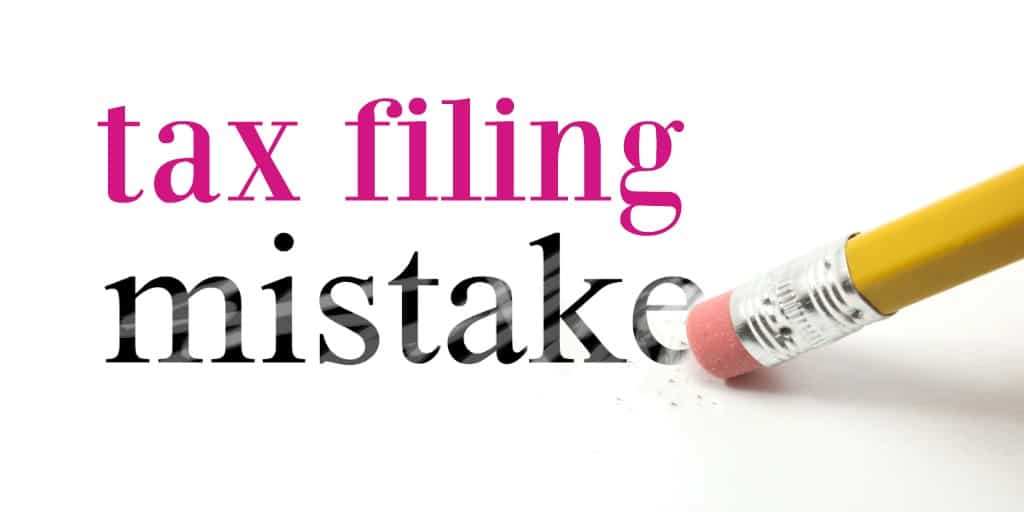What Common Tax Mistakes Are Made When Filing Returns?
(This page may contain affiliate links and we may earn fees from qualifying purchases at no additional cost to you. See our Disclosure for more info.)
Preparing your own tax return can feel like a very bold endeavor.
When it comes to filing simple short-form returns, there is less chance of making significant errors. These types of returns are pretty straight forward and require you to provide very little information.
While you should proceed with care and caution, you are likely very capable of filing short-form tax returns on your own.
If you are required to file a 1040 long-form tax return with supporting schedules, your level of exposure increases. You must remember the US tax code is a complicated set of rules and regulations.
Even the smallest mistake on your tax return could result in you creating an expected tax liability you didn't foresee.
Also, the amount of information you might have to process makes you more prone to mistakes.
If the cost of tax preparation by a licensed accountant or tax specialist exceeds your budget, preparing your own taxes might be your best option.
If so, understand you are responsible for any errors you make.
While our recommendation is to always discuss your tax situation with a financial professional, we also want to help you by making you aware of some of the common errors people make doing their own tax returns.
Common Mistakes People Make Filing Their Tax Returns
While there are dozens of mistakes people make filing their own tax returns, we're going to focus on 10 of the most common errors. Some of these mistakes might seem unimportant, but rest assured, the IRS requires complete and accurate information on your tax return.
Although tax preparation software and online tax programs can make DIY filing easier, users can still make errors inputting information.
For IRS employees to efficiently process returns and initiate any refund you might be owed, it’s essential to fill out your tax return correctly.
- Missing Social Security Numbers. From cradle to grave, the government identifies us by our unique assigned social security number. On a tax return, this is generally considered the most critical piece of information you need to provide. If you make a mistake, your data could be applied to the wrong individual. This can cause a laundry list of problems. If you are expecting a refund, you'll be waiting a long time. Also, if you are filing a joint return with dependents – all social security numbers need to be accounted for and accurate.
- Misspelled Names. Yes, people misspell their names all the time. The IRS will double-check this information, looking to make sure the name on your social security card matches the name on your tax return. Mistakes could create processing delays or invalidate your return.
- Marking Incorrect Filing Status. This is an error that could potentially affect the calculation of your tax refund or liability. To avoid conflicts between your numbers and what the IRS arrives at using the filing status you select, be very careful and make sure you mark the appropriate box. Also, make sure you choose the correct option based on the definition and your actual status.
- Math Errors. Math errors have the potential of creating unwanted results like subjecting yourself to an unnecessary audit. Common math errors include addition problems, subtraction problems, transposition issues, and percentage calculations. To assure you are submitting the right numbers, use a calculator and double (even triple) check your numbers. An error at any point in the form will affect everything that follows.
- Missing Credits and Applicable Deductions. It's very easy for you to misunderstand the rules related to qualifying for things like earned income tax credits, itemized deductions, and standard deductions. The wrong selections could have a profound effect on your refund or tax liability.
- Wrong Bank Account Numbers. We live in a time where all banking is handled electronically. If you list the wrong bank account number on your return, your refund could end up in someone else's account. Correcting this kind of error is very frustrating and time-consuming. The best-case scenario is your refund will be returned to the IRS where it will be held until you correct the information with them.
- Unsigned Tax Returns. After doing all the hard work to fill out your tax returns correctly, it would be a shame if you forgot to sign a printed return before mailing it. The IRS considers an unsigned tax return to be invalid. If you wait until the last minute, the potential for being penalized for a late return is very high.
- Submitting Electronic Return With Wrong PIN Number. This is the equivalent of not signing a mailed in return. Without the correct PIN, your return will be considered invalid and potentially late.
- Unreported Income. Almost everyone remembers to report primary sources of income like W-2s. Where people fail is neglecting to account for interest (1099-INT) or dividend income (1099-DIV). Other income sources like the sale of assets or independent contractor work (1099-MISC) are sometimes missing too. If the IRS were to think you failed to report certain types of income on purpose, it could result in an audit or other disciplinary action.
- Missing the April Filing Deadline. This is a big problem. Failure to comply with the statutory reporting deadline results in a penalty and interest on any amounts owed. If you feel you won't make the deadline, you can file form 4868 for an extension as long as at least 90% of your estimated liability is paid on time or with the extension.
How To Avoid Errors When Filing Your Taxes
Yes, we all make errors. In the eyes of the IRS – accuracy, completeness, and timeliness are vital to the agency being able to do its job efficiently.
If you do make a mistake filling out and filing your tax return, you will likely get at least one opportunity to fix the error.
However, you can expect delays in processing, which will impact the timeliness of your tax refund – if you’re owed one. You might also become subject to penalties and interest on anything owed.
To prevent and/or avoid errors related to your tax returns, follow these suggestions:
- Take time to proofread the information section of your tax returns
- If possible, have a trusted family member or friend double-check your information
- Make sure you account for and have documentation to support all forms of income
- Use a calculator for calculations of any kind
- Triple check your social security number and banking information
- Sign and date the return if you plan to mail it in
- Don’t wait until the last minute to do your taxes
- Mail or submit your return on time
One final word of advice. If you consistently have issues filing your taxes on your own, do whatever you can to hire a professional to help you with the process.
For some people, the added stress of doing their own taxes just isn’t worth the money they save. Also, you might save enough from errors they correct to compensate for the fee you will pay to have the return prepared.
File Your Taxes Online, with a Tax Pro, with H&R Block's Tax Pro Go!

Written by Women Who Money Cofounders Vicki Cook and Amy Blacklock.
Amy and Vicki are the coauthors of Estate Planning 101, From Avoiding Probate and Assessing Assets to Establishing Directives and Understanding Taxes, Your Essential Primer to Estate Planning, from Adams Media.


